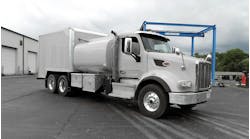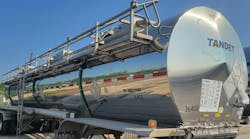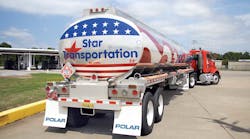Thirteen years ago, the operation that became Star Transportation LLC consisted of just two petroleum transports. The rigs were used to support Lone Star Company Inc, a small petroleum marketer in Jonesboro, Arkansas.
Today, it's a far different story. Star Transportation has become the dominant part of the operation, and Lone Star has downsized to four c-stores from nine. The fleet provides for-hire carriage of fuels with 60 rigs serving customers across more than eight states.
“We had to adapt to a changing market,” says Al Heringer III, president of Star Companies, which includes Star Transportation and Lone Star. “Diversification into trucking kept us alive as the petroleum marketer side of the business became more challenging and margins declined. Agriculture is a dominant part of the Jonesboro economy, and the seasonality that goes with farming creates a tough environment for a petroleum marketer.”
Lone Star, the marketer side of Star Companies, dates back to 1926, and the first petroleum transports were acquired to support that business. The marketing operation included wholesale fuel sales, as well as the group of service stations and convenience stores.
“My grandfather and father built a successful petroleum marketing business, but it was tough work,” Heringer says. “The dominant influence of agriculture in this market means that spring and summer bring a lot of activity. In the fall and winter, though, sales of motor fuels drop significantly.”
Dominant operation
Star Transportation was established in 1994 in an effort to reduce the impact of the seasonal fluctuation in business activity. However, it wasn't long before the petroleum hauling operation became the dominant part of the business.
“It's sort of like the tail started wagging the dog,” Heringer says. “Our fleet operations generate far more than the four c-stores that we still operate. All four of those stores are within 15 miles of our Jonesboro office. As an aside, three of those c-stores have car washes, and we purchase the cleaning supplies through the CBC C-Buying program.”
Heringer and his son, Al Heringer IV, have pursued an aggressive growth strategy that included expanding the carrier's service area throughout Arkansas and into Louisiana, Texas, Mississippi, Alabama, Tennessee, Missouri, and Oklahoma. Most of the carrier's 60 rigs are based at the headquarters terminal in Jonesboro, but the company also has trucks at petroleum terminals throughout the operating area.
Star Transportation handles a full range of refined fuels, including propane. “We haul propane primarily in the winter and only in the Jonesboro area,” he says. “It helps keep our drivers and trucks busy during the time of year that is slowest for motor fuels.”
Big retailers
Big box retailers — such as Wal-Mart and Sam's Club — also are part of the carrier's strategy to keep drivers and trucks busy. Star Transportation has done very well with these types of customers. In fact, the fleet was named 2005 Fuel Carrier of the Year by Sam's Club.
“We like the big box stores with fuel retailing operations because they are high-activity customers,” Heringer says. “They give us 12 months of business, which keeps our trucks busy throughout the year.”
Many of these customers have installed large storage tanks (at least 20,000 gallons capacity) for unleaded regular and slightly less for the other fuel grades, and Heringer sees this as good for his company. “Bigger customer tanks mean more efficient use of our trucks,” he says.
Heringer stresses that Star Transportation works very closely with its customers to achieve a high level of service. “This is a relationship business,” he says. “Good service is more critical than low rates for most of our customers.”
Services include remote monitoring of c-store inventories for a growing number of the carrier's customers. “We want to do more of that,” Heringer says. “We can do a better job of scheduling our equipment when we have a role in managing customer inventories.”
Fleet dispatchers
Seven dispatchers at the Jonesboro terminal are responsible for monitoring customer inventories and scheduling deliveries. Helping them with the fleet management duties are three area managers, who visit regularly with the drivers based at various locations throughout the Star Transportation operating area.
“Our objective is to keep the fleet rolling virtually around the clock,” Heringer says. “Our tractors each run an average of 130,000 miles a year, and we slipseat as many of them as we can. We have to keep our equipment moving to make money.”
Drivers are the key to squeezing maximum productivity out of the fleet, and they are the biggest variable in the operation, according to Heringer. The carrier focuses on hiring experienced professionals who already understand the petroleum hauling business.
Heringer emphasizes that he believes petroleum hauling is no place for a driver fresh out of truck driving school. It's a demanding job, and too many things can go wrong for a novice.
Star Transportation prefers experienced truck drivers with a minimum of two years experience hauling petroleum products, and they must have valid tank and hazmat endorsements. The carrier offers a good pay and benefits package to attract those candidates, many of them recommended by Star Transportation's veteran drivers.
Each candidate's driving record and employment history are examined closely prior to hire. Newly hired drivers spend a couple of weeks in on-the-job training. During that time, they receive credentials from the petroleum terminals and complete any required terminal training.
Late-model tractors
Drivers are assigned to tractors that typically are no more than three years old. Star Transportation has a very aggressive replacement schedule. Even this year — one of the slowest sales years for new tractors in quite some time — the fleet continued to add new equipment.
Star Transportation runs primarily Kenworth and Peterbilt tractors. However, the carrier also bought several Mack CH-Model tractors within the past year.
Weight is a critical factor when new tractors are specified, according to Ted Davis, Star Transportation fleet manager. “We want to keep tare weight under 14,000 pounds so we can haul a maximum load of fuel,” he says.
The Kenworth and Peterbilt tractors are specified with Caterpillar engines rated at 430 horsepower and 10-speed Eaton Fuller transmissions. The Macks have a Mack drivetrain. All of the tractors are specified with the AMOT automatic shutdown system to prevent engine runaway at the loading rack. The newest tractors in the fleet also have the Bendix roll stability system.
Weight-saving features include a single 80-gallon fuel tank, just two batteries, lightweight fifthwheel, and aluminum disc wheels. Product handling equipment includes clutchless Muncie PTOs and Blackmer and Roper pumps.
Four-compartment petroleum trailers with a 9200-gallon capacity are the standard for Star Transportation. Most of the trailers handle the full range of fuels transported by the carrier, but the company does run a few dedicated jet fuel tankers.
In recent years, Polar Tank Trailer LLC has been the primary supplier of DOT406 petroleum trailers to the fleet. “Availability and price played a big role in the decision to focus on Polar trailers,” Heringer says. “However, we've also been impressed with Polar's service commitment. In addition, Polar has good people who work well with us.”
Tank hardware includes Emco Wheaton air-operated internal valves and API heads, Kanaflex and Thermoid hoses, and PT Coupling hose fittings. The newest tank trailers were specified with Hendrickson Intraax air suspensions, Meritor Tire Inflation System by PSI, aluminum disc wheels, and Firestone tires.
With its up-to-date fleet, veteran driver force, and lean management team, Star Transportation has what it takes to provide customers with the outstanding service they expect.









